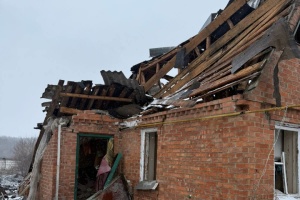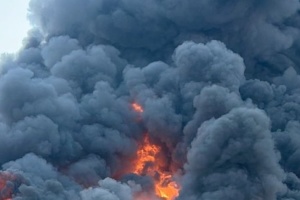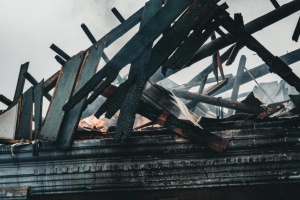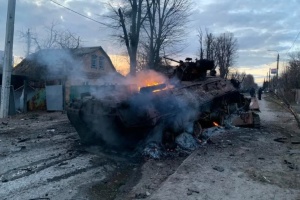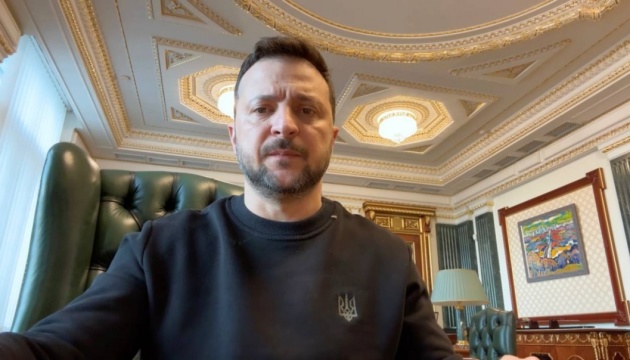
Zelensky: Kharkiv sector strengthened, situation difficult but under control
Ukrainian President Volodymyr Zelensky said this in his nightly video address, Ukrinform reports.
"Commander-in-Chief Oleksandr Syrskyi reported on the situation in the areas of hostilities. Donetsk region, Kharkiv region - where it is most difficult now, he is in the key places of battles, working with brigades in combat positions. It is still too early to draw conclusions, but the situation is under control, our soldiers are destroying the occupiers who are trying to advance. Everything is quite tense, but we strengthened the sectors, particularly Kharkiv. And now many soldiers, especially those from Kharkiv, came to the defense of the Kharkiv region. They are doing their job, and I thank them for their effectiveness," Zelensky said.
Early on May 10, Russian invaders launched an offensive along the border in the Kharkiv region. The evacuation of locals began due to large-scale enemy shelling.
Hostilities in the Kharkiv sector were ongoing as of May 14. The General Staff of the Armed Forces of Ukraine reported that the situation was under control.
In particular, the enemy is attacking the northern outskirts of Vovchansk. Small arms battles are going on there. Evacuation from the town is becoming more difficult, but according to the regional administration, it will last until all civilians are evacuated.
More than 7,500 citizens have already been evacuated from the border settlements of the Kharkiv region due to active hostilities.
Full text of the president's address
I wish you health, fellow Ukrainians!
This day brought us more opportunities. First of all — the Commander-in-Chief Oleksandr Syrskyi — he reported on the situation on the battlefields. The Donetsk and Kharkiv regions — where the situation is the most difficult. He is staying right in the key combat areas — working with brigades, in combat positions. It is too early to draw conclusions, but the situation is under control. Our warriors are destroying the occupier who is trying to advance: everything is quite tense. But we have reinforced the directions, including the Kharkiv ones. Many warriors — especially Kharkiv residents — have risen to defend the Kharkiv region. They are doing their job, and I thank them all for their efficiency.
The second point is international negotiations. Today I had a meeting with the U.S. Secretary of State Blinken. We talked mainly about our defense, and in particular about the delivery of American defense assistance. We need to significantly speed up the supply process. Currently, the time gap between the announcement of packages and the actual appearance of weapons on the frontline is too large. It is important to make the implementation of decisions and logistics more efficient. We also discussed air defense systems — the systems we need. Especially for Kharkiv, for the Kharkiv region. If we had already received two Patriots for this region, it would have made a difference in the overall situation in the war. I am grateful to each of the partners who understands this and really tries to help. Every day, Russian terrorists attack Kharkiv, our other cities and communities in the border area, and our frontline positions with missiles and guided aerial bombs. It is critically important to increase the potential of our air defense, and our aviation, including expanding the coalition of fighter jets, and accelerating training and deliveries to provide protection against Russian terror. We are aware of the actual capabilities of our partners. Clear political decisions are needed. Of course, we discussed with the U.S. Secretary of State the participation of America in preparations and holding of the Peace Summit and America's efforts to ensure a broader representation of the world and to make the Summit more effective. Now the conditions have been created for the world majority to begin to force Russia into peace. Into real peace. We see what Putin is betting on now: he wants to fully adapt Russia to the war and to expand the war, to increase pressure. But it is our pressure — the joint pressure of everyone in the world who opposes the war, the pressure on the aggressor — that must work and disrupt Russia's offensive plans — disrupt them both on the frontline and in the diplomatic sphere. Today I had a long and quite detailed conversation with the President of France Macron — almost two hours. I informed him about the situation on the battlefield, about our prospects, about the needs of our warriors. Emmanuel, Mr. President, confirmed his participation in the Peace Summit, and it’s actually the content of the Summit in Switzerland that will give us an understanding of what other steps we can take in the coming months to bring peace closer and to restore the full force of international law for Ukraine, for all the nations that are subject to aggression. Today I also spoke with the President of the Republic of Korea. We discussed the participation of Korea in the Peace Summit. I am grateful that the Republic of Korea has accepted the invitation to the Summit. We also discussed our bilateral relations and assistance to Ukraine, in particular in those areas where we have already achieved results. And during the first weeks of our marathon preparation for the Peace Summit, I personally invited almost 30 leaders — we have many confirmations of the participation of leaders from different regions, from different parts of the world. And it is important — it is important to keep the world consolidated for the sake of a just peace. When it works for Ukraine, it can work for any country that is subject to aggression.
And one more thing.
NATO. We are getting ready and formulating our positions for the Alliance's Summit, scheduled for this summer. The International Task Force on Security and Euro-Atlantic Integration of Ukraine headed by Andriy Yermak and Anders Fogh Rasmussen has presented its report. The report will be available to all decision makers in the Alliance that can influence the strengthening of NATO. It is a report on Ukraine's prospects, on the need for really strong decisions in order not just to end this war, but to eliminate the justification for any wars in our region and throughout Europe. To do that, we need to eliminate the security deficit in Europe, and in particular the security deficit for Ukraine. We need a strong position of the Alliance and a clear signal to Moscow that the war will get them nothing. Putin will not succeed in substituting terror and bombs for the principles and purposes of the UN Charter and the right of every nation to choose its own national path. I thank everyone who helps Ukraine! Glory to all our warriors, to everyone who defends our state and people!
Glory to Ukraine!

